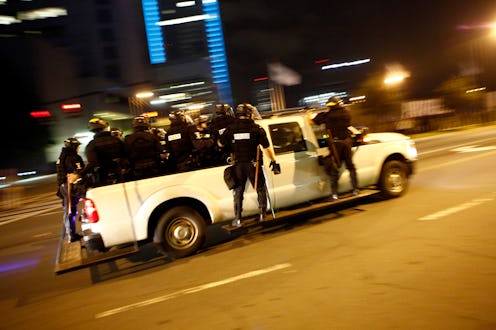News
The Free Hugs Movement Came To Charlotte
Ken Nwadike inspired both anger and gratitude when he took his Free Hugs Project to Charlotte, embracing police and civilians alike. Charlotte has been at the center of national news since the police shooting death of Keith Lamont Scott and the ensuing protests. Still, Nwadike was not deterred when it came to hugging police in riot gear. Some yelled profanities at him, but he continued to embrace officers, many of whom noted afterwards that they were surprised by, but grateful for, his welcoming attitude.
The Free Hugs Project is "an initiative that spreads love, inspires change and raises awareness of social issues through motivational videos," according to its website. Nwadike started the project after the 2013 Boston Marathon bombing, attending the marathon the year after to give participants hugs as encouragement. Now he travels the country as a motivational speaker, spreading his message of love. Nwadike described his Wednesday night experience in Charlotte as "very risky and difficult being on the frontline fighting for peace" in a Facebook post.
"It's about staying neutral, that's what's important. ... We're all human," he told protesters, according to Business Insider. "I don't see it as us vs. the police. We're all human beings. I was pointing out to [protesters] that those specific officers didn't do anything to them," he later said on CNN.
Nwadike's message about being human first is great in theory, but can be difficult to stomach in practice. Scott was killed just a few days after the death of Terence Crutcher, an unarmed black man who was also shot and killed by police. People took to the streets in the wake of Scott's death to protest racially biased police violence. For many, it is hard to stay "neutral," as Nwadike asked.
For Nwadike, however, anger and lashing out are not how to "get past some of these things," KRON reported. San Francisco 49ers quarterback Colin Kaepernick has made waves in the news by refusing to stand during the national anthem to protest racial inequality and police brutality. But Kaepernick has received death threats and criticism for his actions, even though they are non-violent and within his First Amendment rights. Many, including Donald Trump, found Kaepernick's protest unacceptable. If Kaepernick's protest doesn't pass muster, what kind of peaceful resistance does?
Martin Luther King, Jr. is often cited as a representative of peaceful resistance, but even he took issue with people who criticized protests while ignoring the situation that caused the protests in the first place. In his Letter from a Birmingham Jail , King wrote:
You deplore the demonstrations taking place in Birmingham. But your statement, I am sorry to say, fails to express a similar concern for the conditions that brought about the demonstrations. ...It is unfortunate that demonstrations are taking place in Birmingham, but it is even more unfortunate that the city's white power structure left the Negro community with no alternative.
Nwadike's acceptance of all regardless of their occupation or skin color is admirable, but it is not his place to tell people how to protest. The fact remains that Scott was killed by police, and police have not released video evidence to prove that he was, in fact, holding a firearm. In addition, police did deploy tear gas on the crowd, which is not a particularly peaceful move.
The Free Hugs Project may have helped diffuse some tension in Charlotte, but absolute peace is not always considered a viable option for people who have experienced or been exposed to discrimination and violence at the hands of police and public officials.
